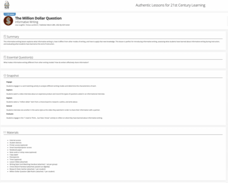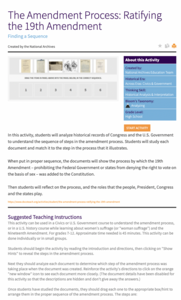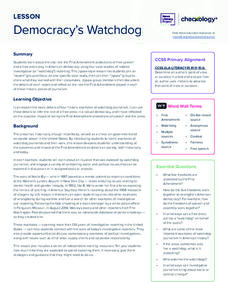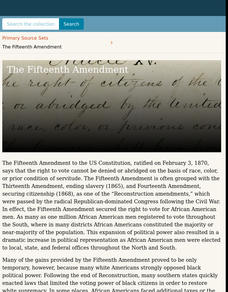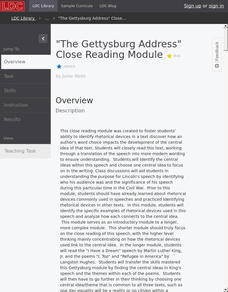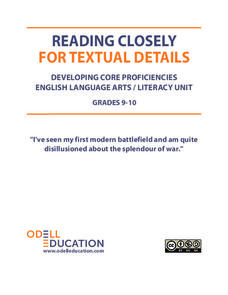Curated OER
Youth Obesity: Schools Fight Back
Kids fight obesity by comparing the USDA food intake suggestions to what they personally consume throughout the day. They watch a video, read texts, and explore related vocabulary which they use as they compose an oral presentation.
K20 LEARN
The Million Dollar Question: Informative Writing
Introduce high school freshmen to the characteristics of informative writing with a 5-day lesson plan that distinguishes informative writing from other modes. Scholars learn how to search for and cite reliable resources, then research...
DocsTeach
The Amendment Process: Ratifying the 19th Amendment
The process for adding an amendment to the U.S. Constitution is long and arduous, by design. High School historians study a series of documents about the Nineteenth Amendment and, using an interactive program, drag the documents onto a...
American Institute of Physics
Historical Detective: Edward Alexander Bouchet and the Washington-Du Bois Debate over African-American Education
Young scientists meet Edward Alexander Bouchet who, in 1876, was the first African American to receive a PhD in Physics. This two-part lesson first looks at the debate between Booker T. Washington and W.E.B. Du Bois about the type of...
News Literacy Project
Democracy’s Watchdog
As part of a study of the importance of the First Amendment, expert groups research different historic case studies of investigative reporting, and then the experts share their findings with jigsaw groups. The case studies include Nellie...
Digital Public Library of America
Fannie Lou Hamer and the Civil Rights Movement in Rural Mississippi
Good primary resources, offering different perspectives on important issues and events, are hard to find. A packet of 12 primary source images, videos, audio recordings, records, and newspaper articles related to the 1960s civil rights...
Digital Public Library of America
Frederick Douglass and Abraham Lincoln
Frederic Douglass and Abraham Lincoln, although dissimilar in their backgrounds, were united in their views about slavery. A set of 14 primary sources permits scholars to examine the views of these two powerful men.
Digital Public Library of America
The Fifteenth Amendment
Fifteen primary sources provide a context for a study of the Fifteenth Amendment to the United States Constitution. The packet captures the excitement for the changes promised by the amendment as well as the backlash against it.
Digital Public Library of America
A Raisin in the Sun by Lorraine Hansberry
A set of 14 primary sources provides background for a study of Lorraine Hansberry's drama, A Raisin in the Sun. Featured are images from stage productions of the play, white supremacy protests, a clip from a television interview, and...
Digital Public Library of America
Their Eyes Were Watching God by Zora Neale Hurston
Zora Neale Hurston's novel Their eyes Were Watching God has been highly praised and severely criticized for its depiction of African American folk culture. A set of primary source materials, including photographs, articles, essays, and...
Digital Public Library of America
The Watsons Go To Birmingham—1963 by Christopher Paul Curtis
A primary source set of photographs, videos, newspaper articles, and FBI reports provides insight into race relations during the 1960s, the Sixteenth Street Baptist Church bombing, and the murder of Emmitt Till. Designed to be used to...
Digital Public Library of America
African American Soldiers in World War I
Finding good primary source materials to support any study of history can be a challenge and time-consuming. A set of 11 primary source letters, images, and text excerpts provide young historians with an opportunity to sharpen their...
Teaching Tolerance
Thanksgiving Mourning
Two primary sources, a speech, and an article provide tweens and teens with different perspectives of the American Thanksgiving holiday. After analyzing Wamsutta James' suppressed speech and Jacqueline Keeler's article, class members use...
National Geographic
Recognizing Native American Perspectives: Thanksgiving and the National Day of Mourning
Thanksgiving—is it a national celebration or the National Day of Mourning? That depends on the point of view. Young historians analyze a speech written by Wamsutta James that presents a Native American view of Thanksgiving. The lesson...
News Literacy Project
InfoZones
Not all information is created equal. Scholars embark on a gallery walk around the classroom to view six examples of information and identify their primary purposes. Next, pupils complete a graphic organizer to evaluate the different...
Education Bureau of Hong Kong
Evaluating Casual Claims
Responsible decision making relies on the ability to a recognize, analyze, and evaluate claims. The worksheets and activities in this 32-page packet teach learners how to distinguish among opinions, reasoned arguments, facts, and logical...
BrainPOP
Famous Historical Figures Lesson Plan: Who Am I?
History detectives select a famous person to research, fill a bag with items associated with their subject, then ask class members to guess the historical figure represented by the artifacts.
Literacy Design Collaborative
Rhetorical Analysis for Pre-AP English
Scholars closely analyze the use of rhetorical strategies in several model texts. They work in groups to annotate the text identifying rhetorical elements, and to complete a Rhetorical Analysis chart and guided reading worksheet....
Literacy Design Collaborative
"The Gettysburg Address" Close Reading Module
It's time to think deep and narrow. Scholars focus close reading on one short text but task take their thinking to a deep level. Readers use a Rhetorical Analysis Chart to analyze The Gettysburg Address and determine how Lincoln used...
Literacy Design Collaborative
Elie Wiesel's Acceptance Speech Analysis
Elie Wiesel's Nobel Prize Acceptance speech provides young historians with an opportunity to demonstrate their ability to use evidence from the speech. They work together to analyze how Wiesel uses rhetorical devices and syntax to...
Odell Education
Reading Closely for Textual Details: Grades 9-10
Pupils work in small groups to answer guided questions and discuss the details they found. They also read independently, improving strategies they learned to approach and question text.
Odell Education
Reading Closely for Textual Details: Grades 9-10
Pay close attention! After finding details in a picture, scholars begin to find details in videos and text. They work together in groups, discuss in pairs, and carry out independent reading to answer guiding questions. Organizers, tools,...
Echoes & Reflections
Contemporary Antisemitism
Despite the recognized atrocities of the Holocaust, anti-semitism continues. The 11th and final installment of the Teaching the Holocaust series explores the long-term effects of the Holocaust on modern anti-semitism, asking pupils to...
Echoes & Reflections
Perpetrators, Collaborators, and Bystanders
After the Holocaust, the world grappled with how to bring justice to the Nazis. But what to do with the thousands—if not millions—who allowed it to happen? Young historians consider the issues of guilt, collaboration, and responsibility...



